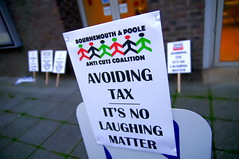Tax Avoidance Vs Tax Evasion
The only similarity between tax avoidance and tax evasion is that they are both known to be activities of tax noncompliance.
Tax avoidance is where one either doesn’t pay specific taxes because they don’t believe in their government’s activities such as their support and /or involvement in war or their right to avoid paying too much tax.
This isn’t illegal but it is heavily frowned upon by HMRC. In fact, they have a group known as the Anti-Avoidance Group designed to persuade the public to not participate in tax avoidance. Tax avoidance is usually accomplished by claiming permissible credits and deductions. Avoidance also can be done by changing a business structure through incorporation or having an offshore company in a tax haven.
Well known-comedian Jimmy Carr, and more than a thousand other wealthy Britons, operated a tax avoidance scheme which allowed them to pay as little as one per cent income tax.
The Arcadia group is run by Sir Philip Green, but the business is in the name of Green’s wife, Tina Green, a Monaco resident, avoiding £285 million in tax that would be payable if a UK resident owned the company. In 2005, Green paid his family £1.2 billion which was placed in offshore accounts in a tax haven, before being transferred into his wife’s tax free bank account in Monaco.
But this isn’t a new occurrence. One historical example was the avoidance of the window tax introduced in England in 1696. The bigger the home, the more windows it was likely to have and the more tax the owners had to pay. The owners avoided the tax by bricking up the windows and the tax was repealed in 1851.
Tax avoidance has been a high-profile part of the English legal system since 1936. In that year, IRC v. Duke of Westminster, Lord Tomlin stated that a taxpayer is free to conduct their affairs how they chose and weren’t obliged to pay the highest amount of tax possible.
This was changed in 1981 in the case of Ramsay by the House of Lords. Lord Wilberforce stated that the courts are not limited to the exact meaning of the statues and regarded to the purpose of the law. This again changed in 2004 by the House of Lords in the case of Barclays Mercantile Business Finance Limited v. Mawson and the IRC v. Scottish Provident Institution. In this case, it was made clear that tax legislation should not be interpreted word for word; instead the statues should be used purposively. This shows that the court’s view is that a tax charge will still appear even if you try your best to avoid it.
As of 2013, Chancellor George Osborne is trying to introduce a General Anti-Abuse Rule also known as GAAR. This act would be used as a blanket law to allow the tax authority to decide between what counts as responsible tax planning and abusive tax avoidance.
However, some people and experts still believe the line will be blurred but some argue that the GAAR will have people think twice before using tax avoidance knowing that there is a high chance that they will have to pay back the tax and pay a fine.
Tax evasion is where an individual or business evades being taxed by illegal means. This is often where a taxpayer twists details or lies about their spending affairs to the tax authorities to reduce the amount of taxes they have to pay. This may entail declaring less received income, profits, or gains than the amount they actually earned or overstating deductions.
It would be worth seeking legal representation in order to ensure that you are treated fairly by HMRC tax inspectors throughout any tax investigation for tax evasion.
Tax evasion is illegal in every country except Switzerland; however it is illegal to deliberately falsify tax records. In November of 2012, the HRMC stated that they “will relentlessly pursue those who don’t all the tax they owe, from financial penalties to criminal convictions.”
In short, tax evasion is a serious offence that could result in criminal prosecution.
Author Bio: David Johnson is a marketing consultant and an enthusiastic writer who is currently working for www.kinsellatax.co.uk

Category: Taxes






